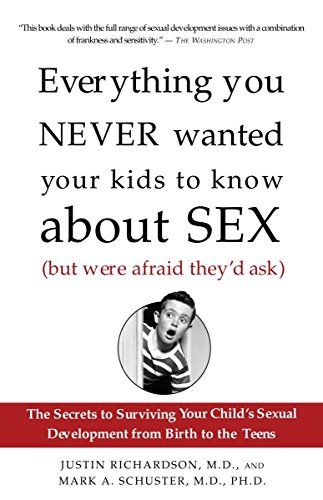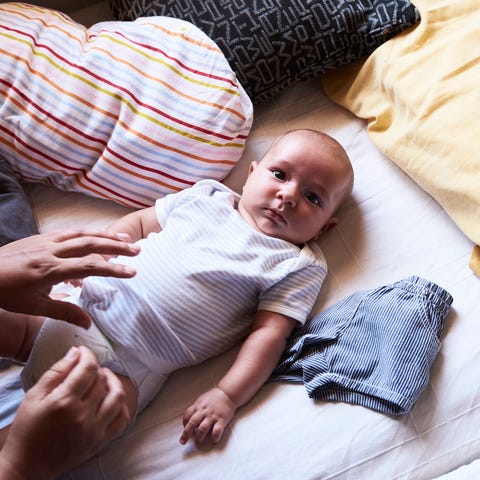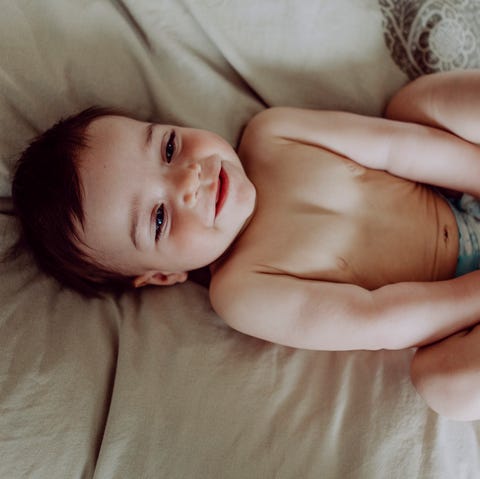My Toddler Won't Stop Touching His Penis. What Should I Do?

My son, Theo, is 19 months old, and he has discovered his penis.
I’ll place Theo on the changing table, then remove his diaper, and his hands will immediately plummet to his nether regions, where he will poke, prod, and pull with wonderment and glee.
His one and only joke in this still-new world is to take his pudgy right hand and, in one swift motion, slap his penis with an open palm, giggling with wild delight.
I laugh at this, naturally, because I love subtle, highbrow comedy. And I relate: “Yes, son, penises are mystifying and hilarious, and just wait until you can pee standing up. Then the world will be your comedic oyster.”
But that recognition also comes with a sense of responsibility. Theo’s mom and I want him to grow up with a healthy sense of sexual well-being while also making sure he doesn’t decide to play scrotum puppeteer at the next birthday party.

Robert Kneschke / EyeEm
The professionals, of course, are forthright about how we can help Theo do this. Pediatricians say self-exploration is expected. Some even label the pursuit as “discovery,” which gives a Shackleton-like grandeur to my son’s endeavors. (No, men, we must turn south! South, with a brave heart and an open palm!)
The American Academy of Pediatrics states that genital exploration usually begins around age one and is completely normal. So why don’t I feel completely normal?

I call Justin Richardson, M.D., the senior associate director of the Columbia University Center for Psychoanalytic Training and Research. He’s a coauthor of the book Everything You Never Wanted Your Kids to Know About Sex (But Were Afraid They’d Ask).
Dr. Richardson shoots straight.
“You feel shame!” he tells me. I immediately feel shameful. “This is how you were raised. You feel embarrassed. You want to look away. This is how shame gets transmitted from generation to generation.”

Westend61
And, in fact, looking away is how most parents react to their child’s “discovery,” Dr. Richardson says. “What you’re communicating to your child by doing that is that even though there are positive feelings attached with touching yourself, that’s not something worth sharing.”
Right now, at Theo’s young age, Dr. Richardson suggests that my wife and I establish a few foundational rules.
First, when Theo touches himself, we continue to engage, smile, and acknowledge his actions. “That feels good, doesn’t it?” we can say. Then we move on. No big deal. Close the diaper. Up off the changing table and on to the next fascination. Don’t linger, but don’t ignore.
Second, we call things what they are. My wife and I had dubbed Theo’s penis a “pipper” and, quickly, so did he. Pipper, though so much fun to say, isn’t penis. Any obfuscation of nomenclature (“privates,” “girl parts”) can create challenges around healthy sexuality, according to the AAP. Dr. Richardson advises labeling parts as “penis” and “testicles” to further help Theo learn himself.

Westend61
The last rule is to stop thinking of “discovery” as a stage or a phase. “Would you say that learning your alphabet is a phase?” Dr. Richardson asks me. “It’s a fundamental, not a phase.” As Theo grows, so too should how my wife and I talk to him about his penis.
Later, when he is in his late twos or early threes, we’ll build upon when and where and what is appropriate. For now, Theo can only comprehend that his penis exists, and slapping it elicits a reaction. It’s my framing I need to adjust.
Instead of sending muddled messages to Theo, my wife and I tell it to him like it is. That doesn’t mean every diaper-changing session needs to be a stern-faced anatomy lesson. Genitals, after all, are so much fun.
Speaking of which, I have a new joke I’ve been meaning to try out on my wife.
A certain 19-month-old taught it to me.
Source: Read Full Article




